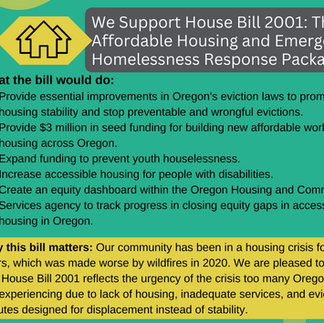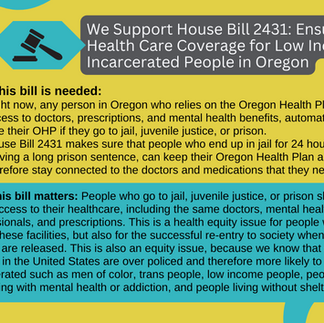
Every year SO Health-E looks for opportunities to advocate for policies that support what our community has told us they want to see. This year, we have endorsed bills in the 2023 Oregon Legislative Session that align with top priorities for Southern Oregonians.
How do we know what is important to our community?
In 2022, SO Health-E conducted a Community Priorities Survey across Jackson and Josephine Counties. Outreach focused on the Latino/a/x communities in Southern Oregon, Spanish-speaking populations, families with children, LGBTQIA+ people, low-income people, and wildfire survivors. Here are the top priorities out of 682 responses:

Basic needs such as affordable and accessible housing, food security, and changes to the criminal justice system of policing, the courts, and how Oregon jails and prisons were run were the top responses. Within these categories, people talked about the impacts of systemic racism and economic inequality, and the needs of people who speak languages other than English. All of these connected issues are health equity issues because they directly impact people's health, even though they aren't traditional "health" issues. Our work is to improve health equity by doing policy work to change these systems so that more people in our community can have their basic needs met, enjoy better physical health and a sense of belonging.
Policies SO Health-E is Supporting

Our Policy Committee looked for bills in the state legislature that would help the problems community members told us were most important to them. Then we carefully read each bill and scored how well it would solve these problems and how much it would directly help our community if it became a new Oregon law. These are the bills we chose to support:
Affordable and accessible housing bills:
We Support Senate Bill 611: The Reasonable Rents Bill
Status of the bill as of April 2023: In the Oregon Senate. There are changes made to the bill (-4 amendments).
What the bill would do after changes made to the bill:
Right now Oregon law allows one rent increase per year of no more than 7% of current rent plus inflation.
The new bill says rent increases could not be higher than 5% of current rent plus inflation, or 10% of current rent, whichever is lower.
Oregon law says rent increase laws do not apply to new homes for the first 15 years after being built.
Why this bill matters: Oregonians need reasonable limits on rent hikes to prevent even more people from losing access to stable housing due to rent increases that they cannot afford. Unreasonable rent increases are one reason so many Oregon workers, families, and seniors have no safe place to call home. Oregon lawmakers must act now.
We Support House Bill 2001: The Affordable Housing and Emergency Homelessness Response Package
Status of the bill: Passed and signed into law!
What the bill would do:
Provide essential improvements in Oregon's eviction laws to promote housing stability and stop preventable and wrongful evictions.
Provide $3 million in seed funding for building new affordable workforce housing across Oregon.
Expand funding to prevent youth houselessness.
Increase accessible housing for people with disabilities.
Create an equity dashboard within the Oregon Housing and Community Services agency to track progress in closing equity gaps in access to housing in Oregon.
Why this bill matters: Our community has been in a housing crisis for years, which was made worse by wildfires in 2020. We are pleased to see that House Bill 2001 reflects the urgency of the crisis too many Oregonians are experiencing due to lack of housing, inadequate services, and eviction statutes designed for displacement instead of stability.
We Support Senate Bill 603: The People's Housing Assistance Fund Demonstration Program
Status of the bill: This bill has "died" for the 2023 legislative session. This means it cannot move forward this year, but could be introduced as a new bill in a future Oregon legislative session.
What the bill would do:
Create and fund a pilot program to study the impact of $1,000 monthly checks for 2 years given to people experiencing houselessness, or who are at risk of becoming houseless, to use for rent, utilities and other basics.
Funding would be managed by the Oregon Housing and Community Services agency, and the study would be done by Portland State University's Homelessness Research and Action Collaborative.
Strong equity language focuses this pilot program on groups who have been most impacted by systemic oppression within the housing market, and who face significant barriers to housing stability as a result, such as people of color, LGBTQ+ people, and people living with a disability.
Why this bill matters: Access to safe, affordable shelter is a basic human need, but due to systemic oppression and rising economic inequality, it is out of reach of a growing number of people in Oregon. Direct income support is a promising practice to ensure access to adequate housing for all Oregonians, and the study will provide needed data on this potential policy tool. Housing is not a privilege for those who can afford it. It is a basic human need, a health equity issue, and we must ensure access for all.
Food Security Bills:
Criminal Justice System Bills:
To see bill information in visual format, click the images in the gallery below:

How does SO Health-E decide to support or oppose a policy?
SO Health-E uses an equity evaluation process, rooted in community feedback, to guide our policy endorsement process.
SO Health-E conducts regular community surveys and listening sessions to identify top priorities for communities of color, people living with a disability, LGBTQ+ people, and low income people who live in Jackson and Josephine Counties. We use these priorities to guide our policy work.
SO Health-E’s equity evaluation process includes both quantitative and qualitative questions to measure the equity impact of a policy. SO Health-E Policy Committee members conduct this evaluation and make a recommendation to the Steering Committee, which makes final policy endorsement votes.
Why did SO Health-E not take a position (support or oppose) on some policies?
SO Health-E’s Policy staff and Policy Committee do their best to scan for priority policies to evaluate, but at any given time there are too many potential policy opportunities to respond to at any given time at the organizational, local, state, and Federal levels.
There are also important policies proposed at times that do not align with community priorities, which is part of our endorsement criteria.
In addition, our policy evaluation process takes time, which makes it difficult to respond to some policies that we find out about on short notice.












Comments